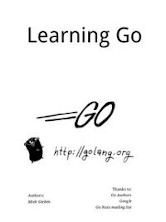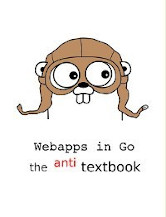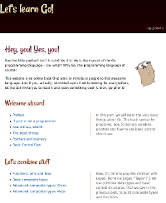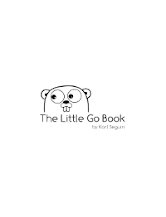Last Updated on November 22, 2025
5. Learning Go by Mike Gieben
 This book is aimed at developers with some knowledge of programming languages and how to program.
This book is aimed at developers with some knowledge of programming languages and how to program.
The best way to learn Go is to create your own programs. Each chapter therefore includes exercises (and answers to exercises) to acquaint you with the language. Each exercise is either easy, intermediate, or difficult.
All exercises in this book work with Go 1, the first stable release of Go.
Chapters cover:
- Introduction – details the lineage of the language and shows the types, variables and control structures.
- Functions – how to make and use functions.
- Packages – functions and data are grouped together in packages. Here you’ll see how to make your own package. How to unit test your package is also described.
- Beyond the basics – learn how to create your own data types and define functions on them (called methods).
- Interfaces – Go does not support Object Orientation in the traditional sense. In Go the central concept is interfaces.
- Concurrency – with the go keyword functions can be started in separate routines (called goroutines). Communication with these goroutines is done via channels.
- Communication – how to create/read/write from and to files. And how to do networking.
This work is licensed under the Attribution-NonCommercial-ShareAlike 3.0 Unported License.
6. Webapps in Go by Suraj Patil
 This book teaches you how to write web applications in Go without using a framework. Each new concept is explained with a valid code example.
This book teaches you how to write web applications in Go without using a framework. Each new concept is explained with a valid code example.
Chapters include:
- Variables & Data Structures.
- Control statements and Functions.
- Struct.
- Object-oriented.
- Interface.
- Concurrency.
- Managing the Workspave.
- Web Programming Basics.
- Basic web application.
- Designing our web app.
- Using databases in Go.
- Accessing the database.
- Retrieving Result Sets.
- Modifying Data and Using Transactions.
- Using Prepared Statements.
- Handling Errors.
- Working with NULLs.
- Working with Unknown Columns.
- The connection pool.
- Surprises, Antipatterns and Limitations.
- Database Encapsulation.
- An Example.
- Working with Forms.
- Uploading files.
- Templates.
- Authentication.
- Files.
- Routing.
- Middlewares.
- Building an API.
- Writing a client.
- Unit Testing.
- Version Control Basics.
The book is released under an open source license.
7. Let’s learn Go by Big Yuuta
 Let’s learn Go is an online resource which aims to introduce people to Go, and have some fun at the same time.
Let’s learn Go is an online resource which aims to introduce people to Go, and have some fun at the same time.
Learn the very basic things about Go. This includes the basic syntax for programs, how to declare variables, pointers, and how to use basic control structure.
The online book then moves on to teaching the reader how to use primitive data types and basic control structures to build composite types and functions. The book later delves deeper into functions and solving real world problems.
This work is licensed under a Creative Commons Attribution-NonCommercial-ShareAlike 3.0 Unported License.
8. The Little Go Book by Karl Seguin
 The Little Go Book is a free introduction to Google’s Go programming language. It’s aimed at developers who might not be quite comfortable with the idea of pointers and static typing. It’s longer than the other Little books, but hopefully still captures that little feeling.
The Little Go Book is a free introduction to Google’s Go programming language. It’s aimed at developers who might not be quite comfortable with the idea of pointers and static typing. It’s longer than the other Little books, but hopefully still captures that little feeling.
Chapters include:
- The Basics.
- Structures.
- Maps, Arrays and Slices.
- Code Organization and Interfaces.
- Tidbits – talks about a miscellany of Go’s features.
- Concurrency.
The Little Go Book is licensed under the Attribution-NonCommercial-ShareAlike 4.0 International license.
Read the book. It’s available in PDF, epub, and mobi. The source code is available from the project’s GitHub repository.
Next page: Page 3 – Go 101 and more books
Pages in this article:
Page 1 – Go Bootcamp and more books
Page 2 – Learning Go and more books
Page 3 – Go 101 and more books
All books in this series:
| Free Programming Books | |
|---|---|
| Ada | ALGOL-like programming language, extended from Pascal and other languages |
| Agda | Dependently typed functional language based on intuitionistic Type Theory |
| Arduino | Inexpensive, flexible, open source microcontroller platform |
| Assembly | As close to writing machine code without writing in pure hexadecimal |
| Awk | Versatile language designed for pattern scanning and processing language |
| Bash | Shell and command language; popular both as a shell and a scripting language |
| BASIC | Beginner’s All-purpose Symbolic Instruction Code |
| C | General-purpose, procedural, portable, high-level language |
| C++ | General-purpose, portable, free-form, multi-paradigm language |
| C# | Combines the power and flexibility of C++ with the simplicity of Visual Basic |
| Clojure | Dialect of the Lisp programming language |
| ClojureScript | Compiler for Clojure that targets JavaScript |
| COBOL | Common Business-Oriented Language |
| CoffeeScript | Transcompiles into JavaScript inspired by Ruby, Python and Haskell |
| Coq | Dependently typed language similar to Agda, Idris, F* and others |
| Crystal | General-purpose, concurrent, multi-paradigm, object-oriented language |
| CSS | CSS (Cascading Style Sheets) specifies a web page’s appearance |
| D | General-purpose systems programming language with a C-like syntax |
| Dart | Client-optimized language for fast apps on multiple platforms |
| Dylan | Multi-paradigm language supporting functional and object-oriented coding |
| ECMAScript | Best known as the language embedded in web browsers |
| Eiffel | Object-oriented language designed by Bertrand Meyer |
| Elixir | Relatively new functional language running on the Erlang virtual machine |
| Erlang | General-purpose, concurrent, declarative, functional language |
| F# | Uses functional, imperative, and object-oriented programming methods |
| Factor | Dynamic stack-based programming language |
| Forth | Imperative stack-based programming language |
| Fortran | The first high-level language, using the first compiler |
| Go | Compiled, statically typed programming language |
| Groovy | Powerful, optionally typed and dynamic language |
| Haskell | Standardized, general-purpose, polymorphically, statically typed language |
| HTML | HyperText Markup Language |
| Icon | Wide variety of features for processing and presenting symbolic data |
| J | Array programming language based primarily on APL |
| Java | General-purpose, concurrent, class-based, object-oriented, high-level language |
| JavaScript | Interpreted, prototype-based, scripting language |
| Julia | High-level, high-performance language for technical computing |
| Kotlin | More modern version of Java |
| LabVIEW | Designed to enable domain experts to build power systems quickly |
| LaTeX | Professional document preparation system and document markup language |
| Lisp | Unique features - excellent to study programming constructs |
| Logo | Dialect of Lisp that features interactivity, modularity, extensibility |
| Lua | Designed as an embeddable scripting language |
| Markdown | Plain text formatting syntax designed to be easy-to-read and easy-to-write |
| Objective-C | Object-oriented language that adds Smalltalk-style messaging to C |
| OCaml | The main implementation of the Caml language |
| Pascal | Imperative and procedural language designed in the late 1960s |
| Perl | High-level, general-purpose, interpreted, scripting, dynamic language |
| PHP | PHP has been at the helm of the web for many years |
| PostScript | Interpreted, stack-based and Turing complete language |
| Prolog | A general purpose, declarative, logic programming language |
| PureScript | Small strongly, statically typed language compiling to JavaScript |
| Python | General-purpose, structured, powerful language |
| QML | Hierarchical declarative language for user interface layout - JSON-like syntax |
| R | De facto standard among statisticians and data analysts |
| Racket | General-purpose, object-oriented, multi-paradigm, functional language |
| Raku | Member of the Perl family of programming languages |
| Ruby | General purpose, scripting, structured, flexible, fully object-oriented language |
| Rust | Ideal for systems, embedded, and other performance critical code |
| Scala | Modern, object-functional, multi-paradigm, Java-based language |
| Scheme | A general-purpose, functional language descended from Lisp and Algol |
| Scratch | Visual programming language designed for 8-16 year-old children |
| SQL | Access and manipulate data held in a relational database management system |
| Standard ML | General-purpose functional language characterized as "Lisp with types" |
| Swift | Powerful and intuitive general-purpose programming language |
| Tcl | Dynamic language based on concepts of Lisp, C, and Unix shells |
| TeX | Markup and programming language - create professional quality typeset text |
| TypeScript | Strict syntactical superset of JavaScript adding optional static typing |
| Vala | Object-oriented language, syntactically similar to C# |
| VHDL | Hardware description language used in electronic design automation |
| VimL | Powerful scripting language of the Vim editor |
| XML | Rules for defining semantic tags describing structure ad meaning |
